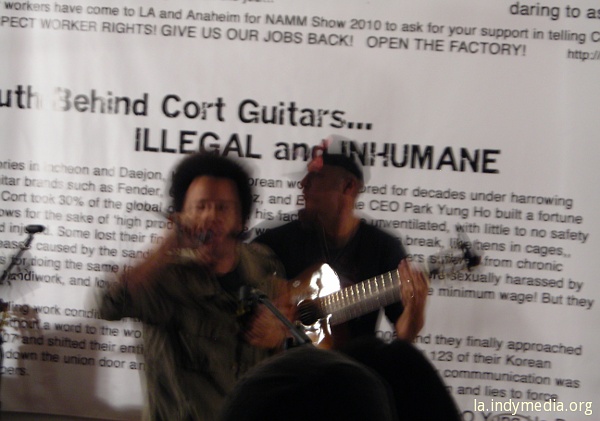
cort-morello-riley.jpg, image/jpeg, 600x421
Famous rock guitarist Tom Morello headlined a small benefit show in Koreatown to raise awareness of Cort guitar's misstreatment of its workers in its Korean plants. Morello was joined by his partner in the band Street Sweeper Social Club, Boots Riley, as well as local artists Skim, Shin Kawasaki, David Tran, Albert Chiang and Sue Jin Kim.

cort-morello-riley.jpg, image/jpeg, 600x421
From 1997 to 2007, Korean workers at Cort and Cor-tek, a part of
Cort guitars, saw their jobs being outsourced to Indonesia. With
no advanced warning, their factories were closed, and all the workers
fired. This is not only a case of a Korean company firing Korean
workers to outsource to another country: Cort's main business is to
manufacture guitars for "American" brands.
Cort's main manufacturing focus is on budget-priced guitars under
contract for numerous well-known American brands, like Fender, Gibson,
Avalon, G&L, and ESP. They also produce for Ibanez, an
originally Spanish company that was acquired by a Japanese company
seeking to enter the American market. Cort also produces its own
brand guitars, which have developed a good reputation, as well as
a big-box brand called Parkwood, which is manufactured both in Korea
and Indonesia.
Cort was founded in 1973 by Jack Westheimer with Yung H. Park.
Westheimer was a businessman who was involved in importing
musical instruments from Japan in the 1960s, when the Japanese economy
was rebuilding from the effects of WW2. Likewise, the trade
alliance with Korea was established, and the economy there was
rebuilding,
and Westhieimer clearly saw opportunities.
The Cort plant formed a union in 1987. In response, Cort
founded Cor-tek, a non-union guitar company the next year.
Only nine years later, in 1997, Cort opened a factory in China.
Over time, Cort and Cor-tek workers were fired and the remaining
workers trained their replacements from China and Indonesia. To
try to fight the increasing job insecurity, Cor-tek workers formed a
union.
Guitar workers in Korea worked in sweatshop conditions.
According to the Cort-Action website:
At the Cort and Cor-tek factores in Daejon and Incheon, ‘cheap guitar’ translated into a pressure for speed, cutting corners on required safety equipment, harassment and forced overtime. They endured the kind of conditions that were optimal for the guitar- not for them. And thus the Cor-tek factory had no windows. A single dust mask was given for an entire week. They couldn’t go home until production goals were met- but weren’t paid for all the extra hours. After 10 years of work, this ’seniority’ still earned them less than 24 dollars a day.
See the Cort-Action website for more harrowing and revolting details
of lost fingers and sexual harrasment, favortism and lies from
management.
The larger story, of course, is that this large global, Korean
outsourcing company is now offshoring work to its factories in other
countries. American brand loyalty is being used by American
companies who moved work to Korean companies that turned around and
sent work out to factories operating in the dictatorships of China and
Indonesia.
The popular American master narrative of globalization centers on
the loss
of work to other countries. The work, itself, is seen as part of
the traditions and heritage of the culture. For example, people
tend to think of musical instruments as cultural artifacts, created by
craftsmen. To protect their work, the craftspersons form
guilds. The craft was industrialized and mechanized, depriving
the craftspersons of their work as it was transferred to less-skilled
assembly line workers. Lower costs for the product lowered prices
and increased sales, which lead to larger profit margins. Industrial
workers unionized to demand the fruits of improved productivity.
The de-skilling of the work allowed for expansion and imitation, and
eventually, overseas competition emerged, that sold similar products at
lower prices. As a response to competion, American companies
established factories overseas, sometimes using the same workers who
were competing (and sometimes, simply bought the competition).
There, the story ends.
Trade
liberalization, labour law, and development: A
contextualization
FTA, Korea-US FTA, and Challenges of the Labor Movement
The
Meiji Restoration and Modernization
Japan's
Colonization of Korea and its Effect on Korea's Modernization
Challenges
of Modernization (information from the Korean embassy)
Colonialism
http://plato.stanford.edu/entries/colonialism/
History of Indonesia
http://en.wikipedia.org/wiki/History_of_Indonesia
http://en.wikipedia.org/wiki/Susilo_Bambang_Yudhoyono
Indonesian Labor and Trade
http://www.dol.gov/ILAB/media/reports/iclp/sweat/indonesia.htm
http://www.ide.go.jp/English/Publish/Periodicals/De/pdf/94_04_07.pdf
The
Earnings Effects of Multilateral Trade Liberalizaton
Trade liberalization has had little effect on poverty and
unemployment, except to increase vollatility. The authors
speculate whether the effect of liberalization has been more
macroeconomic, and subjects workers to more volatility from
macroeconomic shocks like the economic crises of the late 1990s.
American, Japanese autoworkers forge global solidarity
http://www.uaw.org/solidarity/07/0607/work01.php
The UAW and JAW are attempting to work together, some 30 years late.
The Worldwide Class Struggle
http://www.monthlyreview.org/0906navarro.php
Music
Cort timeline
http://cortaction.wordpress.com/timeline/
History of Ibanez
http://www.guitarattack.com/destroyer/lawsuit.htm
History of Japanese Fenders
http://www.guitarsjapan.com/fenderinfopage.html
http://www.guitarsjapan.com/about.html
Ed Roman, some interesting guitar business information
http://www.edroman.com/general/witness.htm
http://www.edroman.com/rants/ghost.htm
The
Role of Yamaha in Japan's Music Development by Tatsuya Kobayashi
Western music in Korea
http://www.lib.monash.edu.au/exhibitions/korean/korean.html
Korean guitar market information
http://www.entrepreneur.com/tradejournals/article/197492810.html